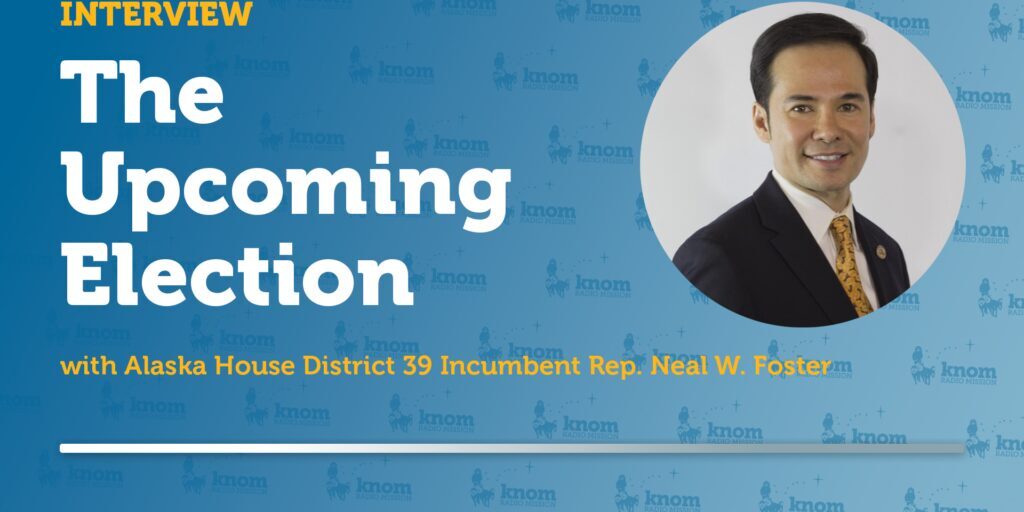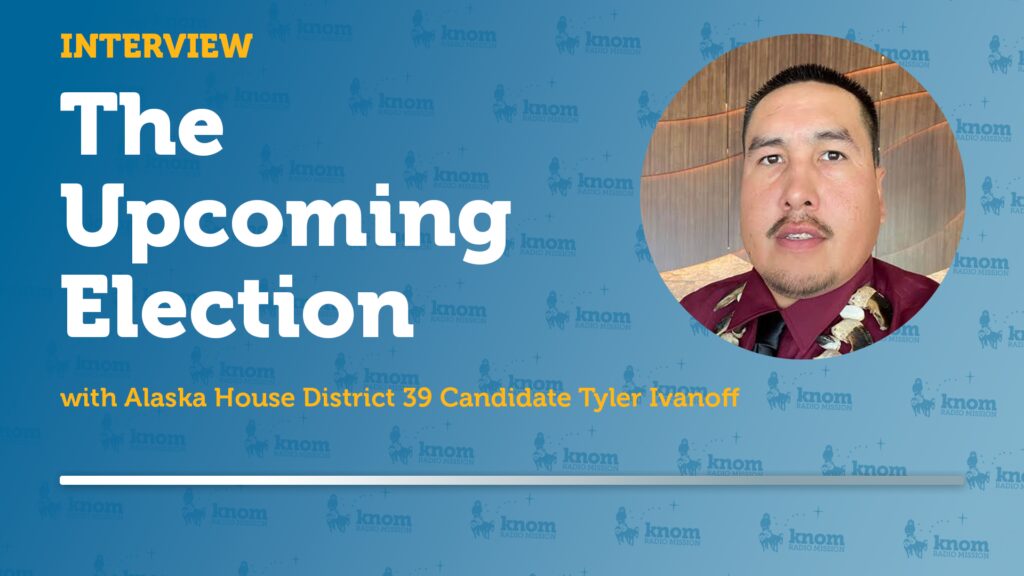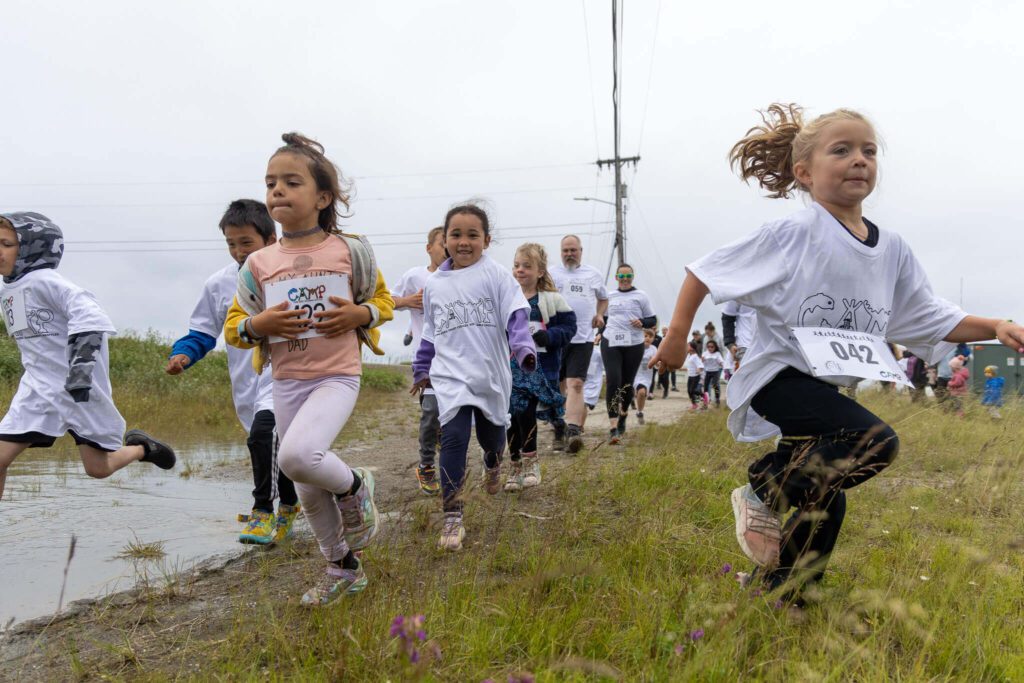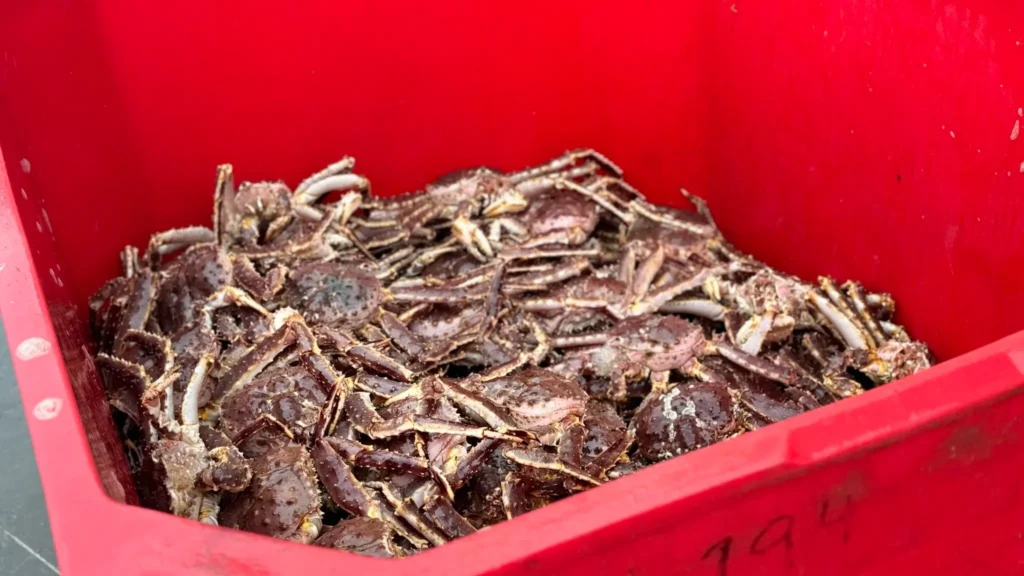Listen to this interview
Ben Townsend
Now we're joined by Representative Neal Foster, he's seeking reelection for the District 39 seat in the Alaska House of Representatives this fall. Neal, welcome to KNOM.
Neal Foster
Thank you for having me, Ben.
Ben Townsend
So you're seeking reelection, you've been in the house since 2009, can you tell me a little bit about your background, your experience serving in the house, and ultimately, why you you've chosen to run for reelection this fall?
Neal Foster
Thank you. A little bit about my background, I was born and raised here in Nome. You know, growing up, I spent a lot of time out in the villages. My family, we owned a air taxi service called Foster Aviation, and so I did a lot of flying out to the villages and, you know, visit folks and and my grandmother, she was my great grandmother was born near Elim on the Tubutulik River there. And my grandma was born in Haycock, which is just north of Koyuk. And so I spent a lot of time just flying out to the villages to visit relatives especially Elim and Koyuk there.
And then growing up went to college and worked after I went to Stanford and did a little short stint at Oxford there, and then worked as a Vice President of Operations for about 10 years at Sitnasuak here locally in charge of our local businesses.
I guess maybe just to kind of get from a high level on my background here, kind of felt like I grew up in two worlds because my grandmother's side I grew up with a subsistence background, harvesting everything from moose and fish and ptarmigan, and picking berries and greens to my grandfather's side, which he actually came from Oklahoma and, and so I also spent summers mining and and he was also a pilot during World War Two. And so I also became pilot myself, not a commercial, but just a private.
I've been doing this for a while now. I feel like I'm really good at it. My seniority, I'm ranked number two out of 40 people in the house and with that brings a lot of power to our district. I feel like I need to capitalize on on the momentum that we have and the strength that our district is currently sitting in to maximize what we can in terms of bringing home the bacon, per se, and also fighting off things that are could be harmful to our district.
Everything from power cost equalization attacks on trying to get rid of that. That's our energy subsidy for our region here and so that's why I want to run, I feel like we're in a really good position and I just hate to walk away from that.
Ben Townsend
Thanks for getting into some specifics. I wanted to dive into more of them now. Talking about priorities, can you off the top of your head list a top three things that you hope to accomplish in another term?
Neal Foster
Yes, absolutely. Well, that's easy. Education is definitely one of those, energy continues to be and subsistence. And it's really actually kind of hard to pick just three, but those are three that I feel are fairly easy. I feel like everything's a priority but I'm happy to elaborate on those three if you'd like me to just jump right into that.
Ben Townsend
Let's start with education, a problem plaguing western Alaska is teacher shortages, recruiting talent to schools on the Seward Peninsula. How do you go about addressing that, and what sort of improvements do you want to see in the future?
Neal Foster
Sure, for more of a higher level, everything starts with a base student allocation, which is the amount of money that we give per student. The amount that the Nome schools were looking for was anywhere between $1,400 to $1,700 per student. I voted for both of those amounts and their amendments to increase it by that amount for the base student allocation.
The votes in the House were for $680. The governor had, in the prior years, vetoed the amount that we put in down to $340, so this year we put in we had enough votes for $680 per student and and I very much support education in our region for a variety of reasons, everything from what you just mentioned about the teacher short shortage to ensuring that our kids have a diversity of classes. Making sure that they can do sports like basketball, they can travel to tournaments, and without this increase, they can't do the travel, they're going to be in big classes. So I support the BSA increase.
And I would say one of the things that sets me apart from you know, my opponent, is because I'm ranked number two in the house that means I'm also in leadership. I've been this year as a part of the leadership team that negotiated with the Senate, with the governor, asking him not to veto down the amount of the BSA that we put in this year. And he didn't.
And of course, it worked. It required that we did a little bit of horse trading, but I was a part of that in I was a part of making sure that we didn't horse trade anything away that was going to be adverse to rural Alaska.
So from the big picture, making sure that we minimize teacher turnover is ensuring that the pay is good, and to do that, we have to have a healthy BSA.
Getting down to more specific programs, we do have what's called the Grow Your Own Initiative, and that's an initiative that is largely targeted towards trying to get teachers in rural Alaska in the teaching positions. If somebody's from a village, they're more likely to want to stay there. It's a program that I support.
During times when the state budget is becoming more difficult to balance because we're seeing declining revenues, you're going to see attacks on programs. The first place that oftentimes the 36 other urban legislators want to attack are rural programs, because there's only four of us in the house.
And so it's been important that we protect programs, and this is one program that could go away if we if we don't have somebody who can stick up for rural Alaska. So that's one of the programs that I very much support, and I think I've got the horsepower to be able to keep that going.
Very proud, by the way, one of my cousins from Elim, she's a teacher, she now teaches in Savoonga, that's one of those great stories of somebody who's from the region, and who's teaching.
I would say those are really the two big things when it comes to education, and there's other things I can talk about too. For example, broadband. We helped to get money in for that. That was a big fight we had, we don't want the digital divide to increase, but I'll keep it at those; the BSA and the program Grow Your Own.
Ben Townsend
I know the the BSA increase was something that officials here, both at the city and the school district, Nome Public Schools, were waiting on the edge of their seats to find out about.
You mentioned another key priority area for you is energy. Tell me what your priorities are in the energy sector.
Neal Foster
That's that's a big one. It's a big one in the sense that there's a program called Power Cost Equalization every single house, only in rural Alaska, is a beneficiary of this. Many people may not even know it, because it appears automatically on our utility bills, and the amount varies by community, but it's as high as $2,800 per year of a subsidy that you see on your electric bill.
And people maybe don't pay attention too much. When it was first put in place, people loved it. It was great. It helps every family out. I think it's been a long time since it's been in, people have come to expect it. But again, with declining revenues, you're seeing an attack on rural programs, and this is one of those.
There's a billion dollars that's in an endowment, and that spins off the interest that that earns, it helps to reduce our cost of energy. So again, every household depending on which village you're in or community, $2,800 per year.
So a few years ago, the majority leader came to me and said, "Neal, I'm sorry, but we're tap into this fund and use some of that to help balance our budget." And I said, "no way it's not to happen." And this year, there's an amendment to also get rid of the PCE program and because of the position that we're in the rural legislators we're able to get in support to push back on that,. It's only because we're in positions of power where I, as a co-chair of finance, we're able to work with other people and say, "Look, I need your support on this, and I can support you on other things." And so we don't want that program to go away.
The other things I wanted to mention about energy, we put in money for weatherization. It's not popular with urban legislators because they're not big beneficiaries of it, but it's huge for us in rural Alaska, again, there's only four of us out of 40, and so we're able to get money for that, as well as renewable energy.
As I've been flying out, I'm sitting next to my airplane right now and hoping to fly down to the southern part of our district, and almost every village I go to they've got a wind turbine. We still have to get all of them online with renewable energy. So it's important that we continue to put money into that fund. So that's another one.
Bulk fuel upgrades. That's a program that's important, because you need to have storage. And so we all have oil tanks in our communities, bulk oil tanks. And some years, there's some folks that want to attack that program as well.
One thing that people may not realize, and that is that urban Alaska, in some respects, they need to be supported, because our power cost equalization formula, the amount of subsidy we get, is tied to their amount. So if they're paying a low amount, that means our subsidy is big to rural Alaska down to the amount, close to the amount that the urban areas are paying.
They're seeing a gas shortage right now. We're actually working with them. We understand what their problem is, they understand what our problem is. We want to work together. So it's a win-win situation for everyone. That's a little bit of the energy topic.
Ben Townsend
And the third priority you mentioned was subsistence. What are ways that you hope to continue allowing people to live their subsistence way of life in another term?
Neal Foster
One of the things that I like to convey about subsistence is how important it is in terms of being tied to the economy. In western Alaska, our economy is a cash and also subsistence economy.
For the first time in a generation, the fight over subsistence is rearing its ugly head, its coming back, and the possibility of what's known as a Katie John case being reversed has huge ramifications.
Already the administration fought a case in court that could have reversed Katie John. Katie John is a case that provides for a rural subsistence preference, and if that case is reversed it could have such horrible consequences for our villages that rely on subsistence.
And so what happened is the administration went to court over a case that's done on the Kuskokwim near Bethel. They lost that case, and so now the administration wants to take that case to the Supreme Court.
So it's a priority for me because my intent as a co-chair of finance is I've got the ability to go and say, "We have the power of appropriation, we have the power of the purse, and I can't give you the the funds, the legal resources you need to fight this case," and if that case is won by the administration and Katie Jones reversed, then the problems that we're seeing right now in our small communities where there's these closures every time you turn around, will be multiplied multiple fold. It's just a really scary thing that's for me, at least, to think about. And so I really want that to be one of my priorities, to stop that from happening.
The other thing I mentioned about subsistence is, last session I co-sponsored a bill that was going to stop large commercial fishing down in area N which is the Aleutians during the month of June to allow for some escapement of fish that are being caught either intercepted or being caught as bycatch. Salmon that are bound for western Alaska.
I also oppose trawling, trawling typically happens more in our federal waters, but we're pushing our federal delegation to oppose the trawling. We're doing whatever we can to try to get the numbers back up here in western Alaska.
I go back to there's four of us in the little Alaska, and there's 36 urban legislators, and so it's a bit of uphill battle, but the way you overcome that is by getting yourself into these key positions. So as the co-chair of finance, I feel like I've well positioned to be able to do that.
The other thing I am going to really be pushing for too is the subsistence board. Fish and game takes their marching orders from the Board of Fish. Right now, there is no mandate that any of those seven board members that are on that board have to represent a subsistence interest, and so I will be pushing to get at least two of the board members to be subsistence representatives.
I think we could get the buy off there, because you have two sport, two commercial, and then one science based, for example NOAA. That way everyone's got equal shot; subsistence, sport, and commercial and then you'd have a tie breaker, which would be the science based. And I tend to think that science tends to support our small fishermen. So anyway, that's where I'm at on subsistence.
Ben Townsend
And as you alluded to earlier, you do have one person at this time that has entered their hat into the ring to seek, you know, unseating you for District 39. This is a position I mentioned earlier you've held since 2009. This would be Tyler Ivanoff's third time trying to unseat you and seek election for the State House of Representatives. What sets you apart from from him?
Neal Foster
Funny story I could just say really quick, what also sets us not apart, and that is he is actually my cousin. He we have the same great, great grandmother and I've met him multiple times and very nice guy.
But if I were to say, what sets us apart? I just got done talking about subsistence, I'm not sure what the rationale was behind wanting to run on the Alaska independent party ticket, because if you go to their website that party is specifically against the type of subsistence that here in western Alaska we enjoy under the Katie John case. Very much against the positions that AFN have come out upon.
That's not something that I would want to do. And the only thing I could imagine was maybe just trying to pick up from the independent voters.
The other thing I was going to say about what sets us apart and the big thing is really my seniority. I'm ranked number two in the house out of 40 people, and anybody new coming in is going to be ranked, you know, number 40 or number 39 in the house, and that's going to set our district back.
We'll have gone from one of the strongest positions to one of the weakest positions. It's just how the system works, everything's based on experience and seniority.
As a co-chair of finance I was in charge of the state operating budget two years ago, and I pushed through the largest permanent fund dividend in our state's history. It was $3,284, because I realize that that's important for our folks in our rural areas here, where the jobs just aren't as abundant as in our similar urban areas.
Power cost equalization, there's always an attack on that our energy subsidy, and I've been able to push back on those because I'm also the longest serving co-chair in our state history, going back to our becoming a state back in 1959. Nobody served as a longer co-chair that I have, and that puts our district in a position of power to be able to advance our interests and push back against things that might be harmful against us.
I would also say that I'm probably the most bipartisan person in the legislature. I have been a member of the majority with both parties for an equal amount of time, and that means that I work with both sides of the aisle well. And for me it's all about who is going to support me in my fight to support rural Alaska in our district.
I guess my question would be, anybody else who wants to come in it's going to take them at least 10 years to build up that seniority to be effective. And are they willing? Are they committed to stick around for at least 10 years? Or do they have the drive to keep fighting, if they have opponents to stay in for at least 10 years.
We're back to having a strong position in the house, so that would be what I would say, apart from my opponents. And again, with all due respect because he's somebody I actually like a lot.
Ben Townsend
Is there anything else that you want to share with your constituents and the voters this November in regards to your reelection for District 39?
Neal Foster
One thing I forgot that I wanted to mention was senior benefits. Again, as the co-chair of finance this year, I was in charge of legislation, and I made a priority because we have so many elders who are struggling to get by just to put food on the table.
And so I pushed this program, it was due to sunset this year. It almost didn't make it through, I made it a big priority to get it through. It's up to $3,000 per year, it's more than a dividend for elders, and it helps to pay for the food and electric bills and heating oil and and I made a big push to get that through, and we got that through and and like I say, we're at kind of a crossroads here, because every year our revenues going down as the amount of oils coming through the pipeline declines.
Everybody's fighting for whatever's left over, and we have to have somebody who's strong down there who's got the power to be able to push back against folks who are trying to take what is fairly due to our district.
I've got that fire to want to keep going, and I just want to say that and also just for sure appreciate everybody's support over the years and and look forward to continuing this. I certainly hope that folks vote for me come August 20 so thank you very much.
Ben Townsend
You just heard from State Representative Neal Foster who's seeking reelection for Alaska House District 39. Neal, thanks for joining us.
Neal Foster
Thank you so very much. Ben, take care.








